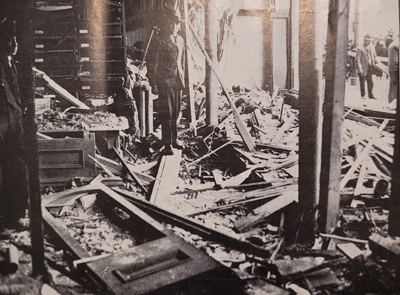Civil War end in sight as Ceasefire order issued de Valera urges ‘movement for peace’
Dublin, 2 May 1923 - A ceasefire order issued by Mr. Frank Aiken on April 27 to anti-treaty forces is being observed across the country.
The order, published in conjunction with a statement of principles from Mr Eamon de Valera, was scheduled to take effect from noon, April 30 and in the couple of days since reports indicated a reduction in ‘Irregular activity.’ From Cork City and county, for instance the last couple of days are reported to have been among the quietest for months.
The Press Association has noted that ministers have been moving more freely of late with W.T Cosgrave and General Mulcahy seen in open touring cars travelling in Dublin. However, the officials response to the order has been one of silence and the Cabinet has not yet met to discuss its implications.
‘The general attitude here is one of caution ’, the Press Association’s Dublin Correspondent notes, ‘and the public will, no doubt, watch the events of the next few days before accepting as genuine the Irregulars assurance of peace.’
The order to ceasefire was issued alongside six principles in which Mr de Valera set out the readiness of the Government of the Republic ‘to negotiate an immediate cessation of hostilities.. ’
Notable features of his political principles include: ‘ that the sovereign rights of the nation are indefeasible and inalienable; that all legitimate governmental authority in Ireland . . . is derived exclusively from the people of Ireland; that the ultimate court of appeal deciding disputed questions of national policy and expediency and policy is the people of Ireland..’
The Irish Civil War: Diarmaid Ferriter in Conversation with Ronan McGreevy
The principles set out by Mr de Valera have won support from amongst others, the Labour Party leader, Mr. Thomas Johnson, who believes Mr de Valera’s pronouncement signals his willingness to return to peaceful political action. Mr Johnson added that he hoped that the Government would respond by ordering a cessation of its own activities, including raids and arrests.
Referencing the six points or principles outlined in Mr de Valera’s pronouncement, Mr. Johnson said not only that they were acceptable to him, but they stood ‘to a certain degree for what we of the Labour Party have stood for inside and outside the Dáil.’
Mr de Valera’s document states that his supporters are anxious to contribute to the movement for peace.
[Editor's note: This is an article from Century Ireland, a fortnightly online newspaper, written from the perspective of a journalist 100 years ago, based on news reports of the time.]





















